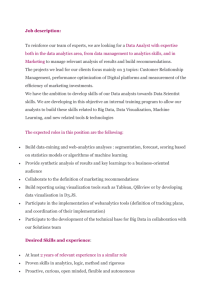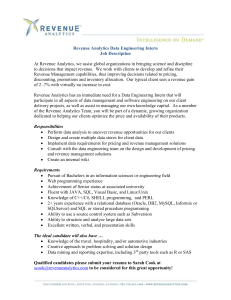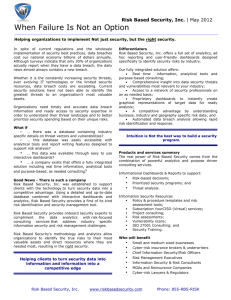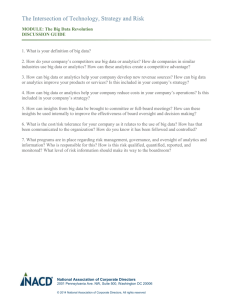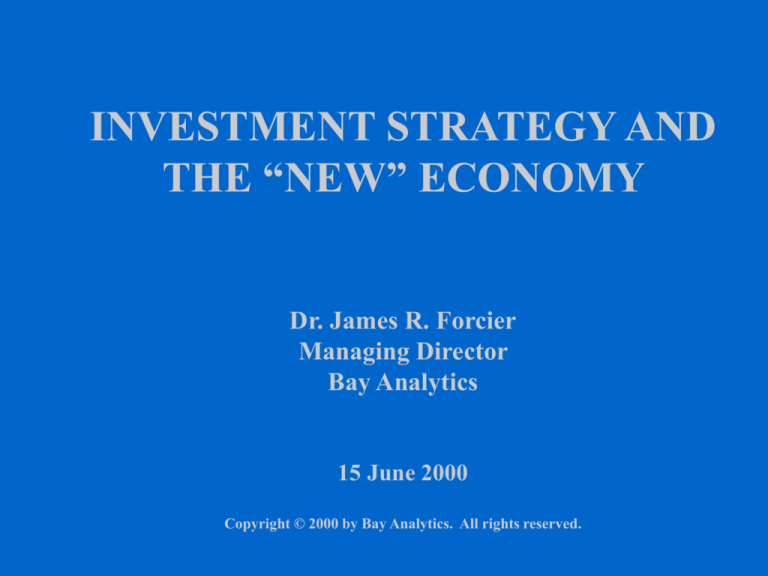
INVESTMENT STRATEGY AND
THE “NEW” ECONOMY
Dr. James R. Forcier
Managing Director
Bay Analytics
15 June 2000
Copyright © 2000 by Bay Analytics. All rights reserved.
Investment Clubs
• Women-only investor clubs earn an
average return of 21%
Bay Analytics
ECONOMIC STRATEGY CONSULTING
Investment Clubs
• Men-only clubs earn 15%
Bay Analytics
ECONOMIC STRATEGY CONSULTING
Economics Defined
• Macroeconomics:
– Economy-wide & inter-economy concerns
• Inflation
• Unemployment
• Trade policy
Bay Analytics
ECONOMIC STRATEGY CONSULTING
Economics Defined
• Microeconomics:
– Firm and market concerns
• Regulation/deregulation
• Pricing
• Competition
Bay Analytics
ECONOMIC STRATEGY CONSULTING
Management Consulting
• Business school tools:
• Quantitative, qualitative methods
• Marketing
• Human resources
• Business law
– Andersen, Deloitte & Touche, McKinsey
Bay Analytics
ECONOMIC STRATEGY CONSULTING
Economic Consulting
• Economic tools
• Regression analysis, modeling
• Antitrust, regulation
• Litigation-support orientation
– NERA, Charles River Associates, Law and
Economics Group
Bay Analytics
ECONOMIC STRATEGY CONSULTING
Economic Strategy Consulting
• Microeconomic tools applied to business
decision-making
• Market analysis (Round 1)
• Competitive strategy (Digital Island)
• Firm & product positioning (Handtrade.com)
• New offering development (Visa USA)
– Bay Analytics
Bay Analytics
ECONOMIC STRATEGY CONSULTING
The “New Economy”
• What is the “New Economy?”
– Something other than the “old” economy
• Internet commerce?
• Venture-funded start-ups?
• IPO frenzy?
• Heroic stock valuations?
Bay Analytics
ECONOMIC STRATEGY CONSULTING
Capitalist (“mixed”) Economy
• Markets used for most transactions
• Unconstrained producers and consumers
• Unfettered industry entry and exit,
capital & labor flows
• Limited government involvement
Bay Analytics
ECONOMIC STRATEGY CONSULTING
The “New Economy” Defined
The “old” economy
+
The application of computing technology
=
Significant changes in long-standing ways
of doing business
Bay Analytics
ECONOMIC STRATEGY CONSULTING
The “New Economy” Defined
• Microeconomic characteristics (1)
– Technology entrepreneurs and enablers
(software engineers, dot.coms, click and
mortars, incubators)
– Wireless telecommunications and data
(telephony, PDAs, SMS, 3G)
– Business data management systems (SAP,
Oracle)
Bay Analytics
ECONOMIC STRATEGY CONSULTING
The “New Economy” Defined
• Microeconomic characteristics (2)
– Internet services: electronic mail, WWW,
portals (Yahoo, Lycos)
– Internet infrastructure: intelligent
networking companies (Digital Island),
infrastructure providers (Cisco Systems)
– Internet content providers: NYT, Disney
Bay Analytics
ECONOMIC STRATEGY CONSULTING
The “New Economy” Defined
• Macroeconomic characteristics (1)
– Increased world trade
– Internationalized capital and production
flows
– Domestic labor flexibility & mobility
Bay Analytics
ECONOMIC STRATEGY CONSULTING
The “New Economy” Defined
• Macroeconomic characteristics (2)
– Low inflation and unemployment from...
• Increased market competitiveness
• Worker productivity growth due to information
and communication technology
Bay Analytics
ECONOMIC STRATEGY CONSULTING
The “New Economy” Defined
– Worker productivity growth due to
information and communication technology
• Business investment in computer technology has
grown from 7.7 % of total durable equipment
investment in 1990 to 45.7 % in 1998
Bay Analytics
ECONOMIC STRATEGY CONSULTING
The “New Economy” Defined
– Worker productivity growth due to
information and communication technology
• Increase in output growth as a result of
computers may explain productivity growth from
0.33 percent 1993 to 1995 to 2.2 percent 1996 to
1998
• Increasingly accepted by economic policymakers
Bay Analytics
ECONOMIC STRATEGY CONSULTING
The “New Economy” Defined
– General characteristics:
• Computer-based
• Time-compressed
• Disintermediated
• Rapid evolution/changes
Bay Analytics
ECONOMIC STRATEGY CONSULTING
“New” Vs. “Old” Economies
• How is the “New Economy” new?
– Moves at a faster speed
– Fewer intermediaries in transactions
– Production factor (capital, labor, technology)
shift?
Bay Analytics
ECONOMIC STRATEGY CONSULTING
“New” Vs. “Old” Economies
• Is the “New Economy”…
–
–
–
–
–
No longer capitalistic?
Constraining producers and consumers?
Relying on non-market transactions?
Restricting industry entry and exit?
Imposing greater government interference?
Bay Analytics
ECONOMIC STRATEGY CONSULTING
“New” Vs. “Old” Economies
– Rather than displacing microeconomic
theory, the New Economy magnifies and
exemplifies it
• More new businesses, products, services, features
• Greater disintermediation = fewer “middlemen”
• More markets with more participants, greater
transparency, greater liquidity
• Greater labor productivity
• Increased wealth across all societal levels
Bay Analytics
ECONOMIC STRATEGY CONSULTING
“New” Business Valuations
– Excessive for many firms without clear
prospects
• Do not reflect discounted future cash flows or
earnings
• Do not reflect reasonable economic assumptions
about growth or prospects
Bay Analytics
ECONOMIC STRATEGY CONSULTING
Valuation Examples
• Amazon - no earnings yet despite premier
Internet positioning
• Webvan - grocery home delivery with huge
capital investment in facilities
• Intel - earnings from key position in computing
• Cisco Systems - earnings from ‘Net
infrastructure
• Vodafone AirTouch - largest wireless operator
• Palm - enormous potential?
Bay Analytics
ECONOMIC STRATEGY CONSULTING
Internet Business
Opportunities
• Retail value of e-commerce estimated to
be $20 billion by 2004
• Internet industry, 1999:
–
–
–
–
Revenues grew 62 percent to $524 billion
Created 650,000 jobs
Now employs 2.5 million people
Revenues could hit $850 billion this year
Bay Analytics
ECONOMIC STRATEGY CONSULTING
Internet Potential - Consumer
– CyberShopper ‘99 Survey of 1,000 American
Internet users:
• 53 percent of users surveyed purchased an item
online (2x 26 percent in 1997)
• Spending an average of $206 per online purchase,
up 38 percent in past 12 months
• 36 percent of Internet shoppers still apprehensive
about Internet security
Bay Analytics
ECONOMIC STRATEGY CONSULTING
Internet Potential - Consumer
– CyberShopper ‘99 Survey of 1,000 American
Internet users:
• Purchasing fewer products from retail stores (35
percent) and catalogs (38 percent)
• 70 percent believe information they find while
"shopping" on the Internet strongly influences
their overall purchasing decisions
• Concern about online credit card fraud has
dropped by about half (to 21 percent) since 1997
Bay Analytics
ECONOMIC STRATEGY CONSULTING
Internet Potential - Consumer
– New York Times research on U.S. Internet
Users (reported 5/24/99):
• Products leading online sales
– books and publications (52 percent)
– computer software (42 percent)
– travel-related items (37 percent)
• Clothing/apparel shows largest growth in online
purchases – 149 percent increase since 1998
Bay Analytics
ECONOMIC STRATEGY CONSULTING
Internet Potential - Consumer
– New York Times research on U.S. Internet
Users reported 5/24/99:
• 99 percent of respondents said they are at least
“somewhat satisfied” with Internet purchases
• 79 percent report being “very satisfied”
• 83 percent of users in the market for a new
vehicle plan to use the Internet in their purchase
process
Bay Analytics
ECONOMIC STRATEGY CONSULTING
Internet Potential - Business
• Online retailing may not be more cost
effective than traditional retail stores
• Example: REI
– Internet site requires smaller staff, but
higher salaries for technological knowledge
– 300-person Seattle store and 60-person
Internet site payrolls about equal
Bay Analytics
ECONOMIC STRATEGY CONSULTING
Internet Potential - Business
• Online retailing may not be more cost
effective than traditional retail stores
• Example: REI
– Incessant requirement for upgrades has
forced spending of $15 million on technology
since 1996
– Many buyers expect products will arrive
more quickly than catalogue orders
Bay Analytics
ECONOMIC STRATEGY CONSULTING
Internet Potential - Business
• Online retailing may not be more cost
effective than traditional retail stores
– Cost-reduction from disintermediation, time
and labor savings
• For many intermediaries eliminated, new ones
are created
• Example: Amazon.com:
– Ingram Book as an intermediate supplier
– UPS and DHL for delivery
– AOL for customer acquisition
Bay Analytics
ECONOMIC STRATEGY CONSULTING
Internet Potential - Business
• Online retailing may not be more cost
effective than traditional retail stores
– Real questions are cost and customer
acceptance
Bay Analytics
ECONOMIC STRATEGY CONSULTING
Internet Potential - Business
• Greatest potential for Internet growth
probably lies in business cost reduction and
customer-specific marketing & sales
– Reduction in production times
– Reduced inventory and labor costs
– Mass customization
Bay Analytics
ECONOMIC STRATEGY CONSULTING
Internet Potential - Business
• Buyer consortia for production purchasing
– Auto manufacturing: Ford, GM, Daimler
– Electronics
– Aerospace
– Replaces Electronic Data Interchange
Bay Analytics
ECONOMIC STRATEGY CONSULTING
Stock Market Economics
• “Buy and hold”
– Power of compounding versus risk of market
timing
• Minimize transaction costs
– Investment advisor versus solo
– Load versus no-load funds
• Performance equivalence
• Front-end/back-end loads, management fees,
expense ratios, long-term cost amortization
Bay Analytics
ECONOMIC STRATEGY CONSULTING
Stock Market Economics
• Start-ups and IPOs
– Small business failure rate is very high (8090%)
– Poor investor returns for most IPOs (in 2/3
of cases share price falls first year)
– Aside from initial share allocation, long-run
average returns from IPOs lag S&P 500
Bay Analytics
ECONOMIC STRATEGY CONSULTING
Stock Market Economics
• Start-ups and IPOs
– Over the past 15 years, 68% (average) of the
firms going public were profitable
– In 1999, only 25% of firms were profitable
Bay Analytics
ECONOMIC STRATEGY CONSULTING
Stock Market Economics
• Start-ups and IPOs
– IPOs with positive earnings per share in
twelve months prior to IPO:
1990
1991
1992
1993
1994
-
Bay Analytics
ECONOMIC STRATEGY CONSULTING
85% (97)
75% (267)
68% (375)
70% (468)
78% (316)
1995
1996
1997
1998
1999
-
72% (363)
63% (431)
68% (304)
59% (222)
22% (441)
Stock Market Economics
• Stock Market “Bubble”
– Price-to-earnings ratios (cost of stock vis-àvis profits) are about twice their historic
average
– Over long run, stocks will regress towards
earnings potential of operating companies
Bay Analytics
ECONOMIC STRATEGY CONSULTING
Stock Market Economics
• The stock market is overvalued
because…
– Investment capital is readily available
– Investors haven’t done sufficient research
– Investors have unreasonable expectations:
• Earnings will produce profits to sustain share
prices and projected price-earnings ratios
Bay Analytics
ECONOMIC STRATEGY CONSULTING
Stock Market Economics
• The good news:
– Investor exuberance reduces the cost of
capital and generates investment funds –
much of which fuels business development
and economic growth
Bay Analytics
ECONOMIC STRATEGY CONSULTING
Stock Market Economics
• Internet risks
• Insufficient net space
– Petstore.com
• “Land grab”- having customers is not enough
– Amazon.com
• Positioning challenge
– (see newspaper advertising example)
• Illusive efficiency - many claims as yet
unsupported
– Webvan (can you say “Peapod”)
Bay Analytics
ECONOMIC STRATEGY CONSULTING
Stock Market Economics
• Internet risks
– Lack of business experience/capability
– Example: Riffage.com
• Palo Alto Internet music site
• Recently purchased Great American Music Hall
• “We don’t have anybody on our staff who knows
about running the Music Hall. That was part of
the attraction for us.”
Bay Analytics
ECONOMIC STRATEGY CONSULTING
Stock Market Economics
• Mounting losses/help needed:
eToys
PlanetRx.com
Autoweb.com
Buy.com
CDNow
Drugstore.com
Bay Analytics
ECONOMIC STRATEGY CONSULTING
Egghead.com
Fogdog.com
Garden.com
HomeGrocer.com
Streamline.com
Cybershop
Stock Market Economics
• 95% of e-tailers won’t survive to see 2001
– iVillage (women’s interest site) - lost $1.30
per dollar in revenue 1Q2000
– InsWeb (online insurance) - shares fell 89%
this year; reducing workforce by 40%
Bay Analytics
ECONOMIC STRATEGY CONSULTING
Bay Analytics
ECONOMIC STRATEGY CONSULTING
Thank You!
Bay Analytics
ECONOMIC STRATEGY CONSULTING




